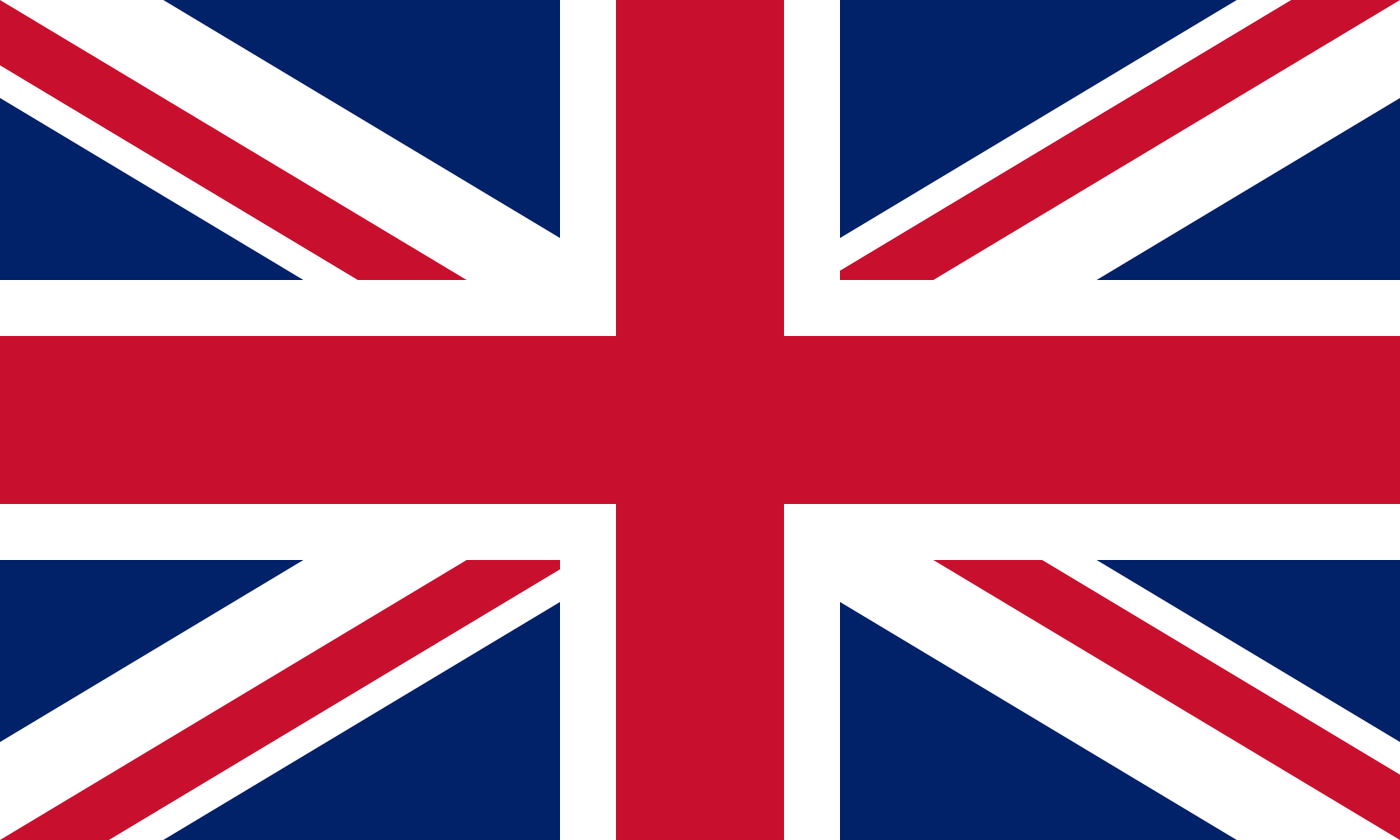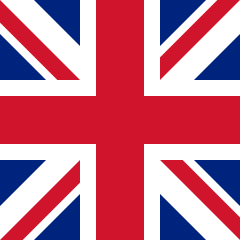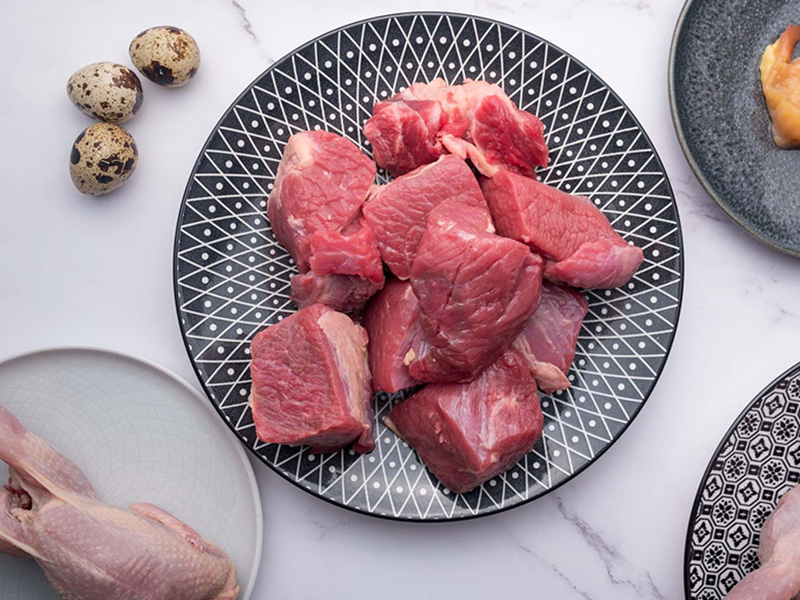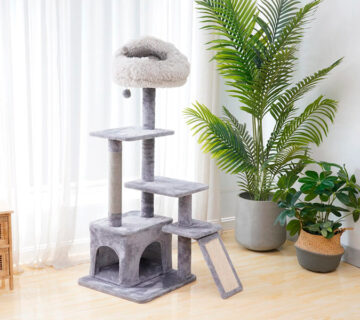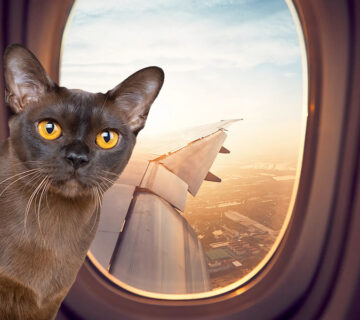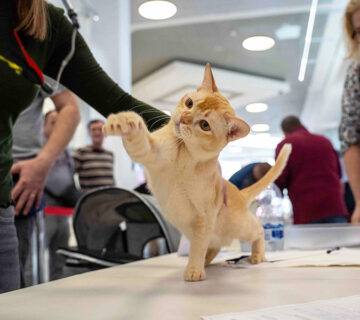Healthy cats ne need a healthy diet to maintain health.
Sick, injured or ill cats need a healthy diet to optimise healing capability.
Young cats need a healthy diet for optimum growth and development.
Older cats need a healthy diet to preserve their faculties and energy levels.
Introduction:
While some cats go out hunting small prey, thereby reproducing a more-or-less natural situation, it is impossible to achieve a completely nature-identical situation for every domestic cat. For this reason, while keeping the ‘ideal’ in view, compromises must be created to suit modern households.
Cats are ‘obligate’ carnivores. This means that they require animal tissues in their food, for supply of their nutrients. They also obtain partly digested vegetable material from the ingesta of their prey.
In the wild, they are live-prey eaters, requiring fresh meat and animal material. They do not eat carrion and are very susceptible to food poisoning, if fed decaying meat products. Food must be fresh.
They depend upon chewing raw meat and bones for healthy teeth and gums.
They are, originally, evolved from desert animals. This means that they are rarely big drinkers and their kidneys are highly efficient.
While we advise natural feeding of mainly raw food, some cats that have been fed manufactured foods for years may completely refuse to change. This is unfortunate but can be a reality we have to face.
Food bowls and water bowls should be ceramic, to avoid harmful chemicals leaching into food or water, and should be kept scrupulously clean, to avoid the risk of food poisoning.
Vomiting or diarrhoea can be a sign of an unsuitable diet.
Suitable foods are:
Fresh meat (not pork, bacon, ham or other pig product) preferably raw – including chicken, rabbit, white fish, oily fish, bone (raw), beef, lamb, pigeon, pheasant etc. In the case of chicken, feeding it raw may incur the risk of Salmonella food poisoning (very dangerous to cats) unless you know the source to be reliable. Frozen meat that has been thawed carefully and not re-frozen is a practical alternative to fresh meat.
Feeding raw meat from wild animals can incur the risk of intestinal tapeworms. This can be monitored satisfactorily by having faeces samples checked in a veterinary laboratory.
Raw fish may contain thiaminase, an enzyme that breaks down Vitamin B1 (Thiamine). This applies particularly to freshwater fish of the Cyprinid family (e.g. Carp. Goldfish, Barb, Dace, Chub, Minnow), herring, shrimps, prawns, mussels and other shellfish. Cooking destroys the
enzyme, so the danger is removed. However, feeding raw fish in moderation should be fine, particularly if supplementing your cat’s diet with brewer’s yeast (at a separate mealtime). High-temperature cooking also destroys thiamine, as can sulphur dioxide food preservative (in some mince, for example). Thiamine can also be lost in cooking water. Steaming is better, from this point of view.
Bones – raw is best – preferably whole but can be minced but the full gum and dental care benefits will be lost if it is not chewed whole. Bone is an important source of Calcium, which is relatively deficient in boneless meat. Of course, we are not considering large bones in this context for cats.
Fresh organic offal (e.g. liver, heart, kidney), not from a pig.
Vegetables – liquidised raw (not juiced unless the pulp is returned to provide essential dietary fibre) or well cooked (steamed or boiled) and mashed. Raw chunks of vegetable are often much enjoyed but provide few nutrients, as a cat’s teeth are unable to macerate them sufficiently.
Eggs (raw or cooked).
Seaweed – cats are often avid eaters of seaweed, if offered. It is an excellent supplement in moderation.
Brewer’s Yeast – an excellent source of the B vitamins (esp. Vitamin B1 – Thiamine) and they make tasty treats. This supplement will counteract problems with raw fish and with sulphur dioxide food preservative. It can also act as a flea deterrent.
Herbs – a good source of minerals and vitamins.
Oil – cold-pressed, not solvent-extracted (e.g. olive oil, sunflower oil, flax oil).
Fish oils.
Cod liver oil (but beware added chemical anti-oxidants).
Cats can eat bread, toast etc., but they would not normally encounter grain starch in the wild, except as part of the partly-digested ingesta of their prey.
They can also eat in moderation (and usually like) cheese and milk products. However, pasteurised milk is not as healthy a food as unpasteurised goat’s, sheep’s or cow’s milk. Cottage cheese and yoghurt are usually very acceptable.
Biscuit-type preparations are not good for gum and dental health, since they give rise and tartar build up.
Supplementing the diet with a mineral and vitamin supplement can be a reasonable ‘insurance’ against imbalance but products should be checked very carefully for unsuitable or unhealthy ingredients and additives.
Healthy scraps, left-overs and titbits (tidbits) are not a crime.
General Notes::
At the Alternative Vet, we advise on natural feeding for every patient, whatever the species, as part of our holistic veterinary service. We do this whatever therapy or integrated program we may be using for a particular patient (i.e. homeopathy, acupuncture, herbal medicine (herbs – phytotherapy), chiropractic manipulation or other therapy).
This advice is based on taking the nearest wild species as a prototype and modelling a diet on the natural diet of that species in its wild habitat.
We do this as the most logical course, since man’s selection of breeds of domestic animal has only occurred over a very short band of time,
when compared with the time that the various species have evolved on Earth and established their niches.
We believe a wholesome diet to be the firm platform on which to build good health and longevity. We also believe that many health problems in all our domestic species stem from unhealthy or unsuitable feeding.
We advise to feed fresh food and to source it from organic suppliers whenever possible, since we believe that to be the healthiest way. Every part of the body and every system of the body functions better on a natural diet.
We advise against the feeding of manufactured foods and freeze-dried foods, which variably suffer from heavy processing, adulteration, denaturing, inclusion of undesirable (and sometimes harmful) additives and vigorous commercial marketing. Such foods do not serve health and well being so much as commercial interest and profit. Furthermore, manufactured and processed feeds have only been marketed over a few decades, which is but a blink in time, so the various species cannot possibly have had time enough to evolve to handle such artificial material.
Processing cannot improve food and the addition of various artificial ingredients can only give the animal’s immune system and metabolism an unwanted job, to rid the body of foreign and possibly noxious material.
We apply exactly the same principles to the feeding of supplements and treats.
Make no mistake, horse foods and pet foods are BIIG BUSIINESS – advertising hype is driven by the promise of huge profits.
Beware the word ‘natural’, as it may falsely be used in advertising. For instance, how can a freeze-dried food be ‘natural’?
We also advise a healthy water supply, which would not always be local tap water.
We advise against supplying animals with softened water for drinking.
N..B..:: This general feeding information is based on the advice given to clients who seek our services. It is opinion. We publish this information in good faith, with the motivation of sharing experiences and improving the health, longevity and well-being of our domestic animals. We make no profit from selling feeding products via this or any other web site and are independent from all manufacturers. Equally, we single out no manufacturers or products for particular criticism. We hope that this information is of value to you and your animal but please contact us if you require further help.
This general advice is not tailored to feeding for specific illnesses, for which we would need to give more individual advice.
Contributor: www.alternativevet.org
